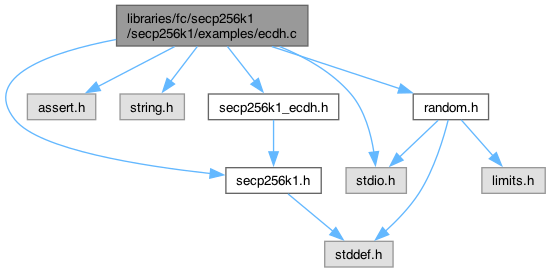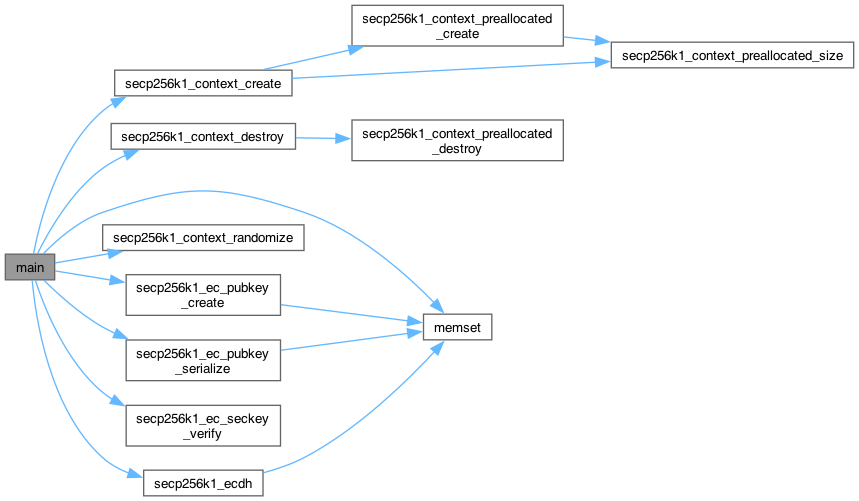Loading...
Searching...
No Matches
ecdh.c File Reference
#include <stdio.h>#include <assert.h>#include <string.h>#include <secp256k1.h>#include <secp256k1_ecdh.h>#include "random.h"
Include dependency graph for ecdh.c:

Go to the source code of this file.
Functions | |
| int | main (void) |
Function Documentation
◆ main()
| int main | ( | void | ) |
Definition at line 20 of file ecdh.c.
20 {
21 unsigned char seckey1[32];
22 unsigned char seckey2[32];
23 unsigned char compressed_pubkey1[33];
24 unsigned char compressed_pubkey2[33];
25 unsigned char shared_secret1[32];
26 unsigned char shared_secret2[32];
27 unsigned char randomize[32];
28 int return_val;
30 secp256k1_pubkey pubkey1;
31 secp256k1_pubkey pubkey2;
32
33 /* The specification in secp256k1.h states that `secp256k1_ec_pubkey_create`
34 * needs a context object initialized for signing, which is why we create
35 * a context with the SECP256K1_CONTEXT_SIGN flag.
36 * (The docs for `secp256k1_ecdh` don't require any special context, just
37 * some initialized context) */
39 if (!fill_random(randomize, sizeof(randomize))) {
41 return 1;
42 }
43 /* Randomizing the context is recommended to protect against side-channel
44 * leakage See `secp256k1_context_randomize` in secp256k1.h for more
45 * information about it. This should never fail. */
46 return_val = secp256k1_context_randomize(ctx, randomize);
47 assert(return_val);
48
49 /*** Key Generation ***/
50
51 /* If the secret key is zero or out of range (bigger than secp256k1's
52 * order), we try to sample a new key. Note that the probability of this
53 * happening is negligible. */
54 while (1) {
55 if (!fill_random(seckey1, sizeof(seckey1)) || !fill_random(seckey2, sizeof(seckey2))) {
57 return 1;
58 }
60 break;
61 }
62 }
63
64 /* Public key creation using a valid context with a verified secret key should never fail */
65 return_val = secp256k1_ec_pubkey_create(ctx, &pubkey1, seckey1);
66 assert(return_val);
67 return_val = secp256k1_ec_pubkey_create(ctx, &pubkey2, seckey2);
68 assert(return_val);
69
70 /* Serialize pubkey1 in a compressed form (33 bytes), should always return 1 */
72 return_val = secp256k1_ec_pubkey_serialize(ctx, compressed_pubkey1, &len, &pubkey1, SECP256K1_EC_COMPRESSED);
73 assert(return_val);
74 /* Should be the same size as the size of the output, because we passed a 33 byte array. */
76
77 /* Serialize pubkey2 in a compressed form (33 bytes) */
79 return_val = secp256k1_ec_pubkey_serialize(ctx, compressed_pubkey2, &len, &pubkey2, SECP256K1_EC_COMPRESSED);
80 assert(return_val);
81 /* Should be the same size as the size of the output, because we passed a 33 byte array. */
83
84 /*** Creating the shared secret ***/
85
86 /* Perform ECDH with seckey1 and pubkey2. Should never fail with a verified
87 * seckey and valid pubkey */
88 return_val = secp256k1_ecdh(ctx, shared_secret1, &pubkey2, seckey1, NULL, NULL);
89 assert(return_val);
90
91 /* Perform ECDH with seckey2 and pubkey1. Should never fail with a verified
92 * seckey and valid pubkey */
93 return_val = secp256k1_ecdh(ctx, shared_secret2, &pubkey1, seckey2, NULL, NULL);
94 assert(return_val);
95
96 /* Both parties should end up with the same shared secret */
97 return_val = memcmp(shared_secret1, shared_secret2, sizeof(shared_secret1));
98 assert(return_val == 0);
99
101 print_hex(seckey1, sizeof(seckey1));
103 print_hex(compressed_pubkey1, sizeof(compressed_pubkey1));
105 print_hex(seckey2, sizeof(seckey2));
107 print_hex(compressed_pubkey2, sizeof(compressed_pubkey2));
109 print_hex(shared_secret1, sizeof(shared_secret1));
110
111 /* This will clear everything from the context and free the memory */
112 secp256k1_context_destroy(ctx);
113
114 /* It's best practice to try to clear secrets from memory after using them.
115 * This is done because some bugs can allow an attacker to leak memory, for
116 * example through "out of bounds" array access (see Heartbleed), Or the OS
117 * swapping them to disk. Hence, we overwrite the secret key buffer with zeros.
118 *
119 * TODO: Prevent these writes from being optimized out, as any good compiler
120 * will remove any writes that aren't used. */
125
126 return 0;
127}
LOGGING_API void printf(Category category, const char *format,...)
Definition Logging.cpp:30
SECP256K1_API void secp256k1_context_destroy(secp256k1_context *ctx) SECP256K1_ARG_NONNULL(1)
Definition secp256k1.c:146
SECP256K1_API SECP256K1_WARN_UNUSED_RESULT int secp256k1_context_randomize(secp256k1_context *ctx, const unsigned char *seed32) SECP256K1_ARG_NONNULL(1)
Definition secp256k1.c:706
SECP256K1_API int secp256k1_ec_pubkey_serialize(const secp256k1_context *ctx, unsigned char *output, size_t *outputlen, const secp256k1_pubkey *pubkey, unsigned int flags) SECP256K1_ARG_NONNULL(1) SECP256K1_ARG_NONNULL(2) SECP256K1_ARG_NONNULL(3) SECP256K1_ARG_NONNULL(4)
Definition secp256k1.c:246
SECP256K1_API SECP256K1_WARN_UNUSED_RESULT int secp256k1_ec_seckey_verify(const secp256k1_context *ctx, const unsigned char *seckey) SECP256K1_ARG_NONNULL(1) SECP256K1_ARG_NONNULL(2)
Definition secp256k1.c:528
SECP256K1_API secp256k1_context * secp256k1_context_create(unsigned int flags) SECP256K1_WARN_UNUSED_RESULT
Definition secp256k1.c:107
SECP256K1_API SECP256K1_WARN_UNUSED_RESULT int secp256k1_ec_pubkey_create(const secp256k1_context *ctx, secp256k1_pubkey *pubkey, const unsigned char *seckey) SECP256K1_ARG_NONNULL(1) SECP256K1_ARG_NONNULL(2) SECP256K1_ARG_NONNULL(3)
Definition secp256k1.c:551
SECP256K1_API SECP256K1_WARN_UNUSED_RESULT int secp256k1_ecdh(const secp256k1_context *ctx, unsigned char *output, const secp256k1_pubkey *pubkey, const unsigned char *seckey, secp256k1_ecdh_hash_function hashfp, void *data) SECP256K1_ARG_NONNULL(1) SECP256K1_ARG_NONNULL(2) SECP256K1_ARG_NONNULL(3) SECP256K1_ARG_NONNULL(4)
Definition main_impl.h:29
Definition secp256k1.c:47
Definition secp256k1.h:70
memset(pInfo->slotDescription, ' ', 64)
Here is the call graph for this function:
